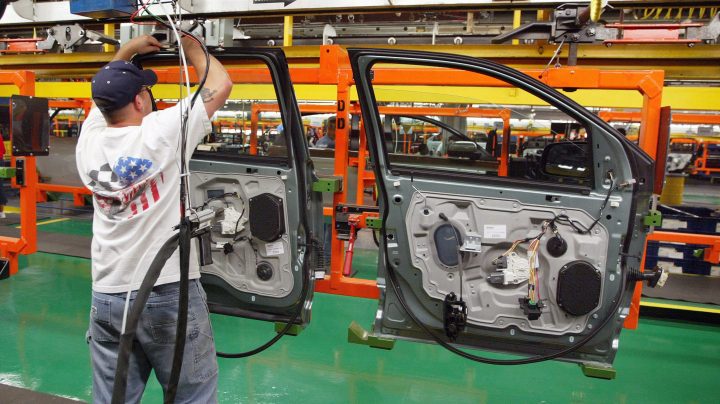
Remember the trade war with China? U.S. businesses are still feeling it.
Remember the trade war with China? U.S. businesses are still feeling it.

Research from the Peterson Institute for International Economics shows that decreasing tariffs by 2 percentage points could reduce inflation (as measured by the consumer price index) by 1.3%. Much of the United States’ current tariff policy comes from the Donald Trump administration’s trade war with China, during which the U.S. placed 25% import duties on some goods.
In 2019, “Marketplace” host Kai Ryssdal spoke with Kevin Feig about how the tariffs were affecting his business, Foreign Parts Distributors in Miami. Ryssdal checked back in with Feig, who is now president of the company, to hear how business is doing. The following is an edited transcript of their conversation.
Kai Ryssdal: So it’s been three years — almost three years now, I guess — since we talked to you back in the days of the very high-profile trade war that was the economic headlines of the day. Now, the headlines are different, but your situation, how’s it been?
Kevin Feig: Yeah, so a lot has changed in the last three years since we’ve spoken. You know, the situation with the tariffs has not changed one bit. We’re still paying 25% tariffs to the United States government on every product that we import from China.
Ryssdal: Give me a for instance. How much are you paying to the Treasury of the United States, right? Because as we talked about in this first interview, not only are consumers paying, but companies are paying as well. What are your — I don’t know, however you categorize it — monthly tariff-induced costs, would you say?
Feig: Yeah, so the monthly payments have gone up tenfold. Traditional duties, most products were at 2.5%, so going to 25[%], you know, it’s a substantial increase. We used to pay anywhere from maybe $30,000 to $60,000 a month in duties to U.S. Treasury. Now, you’re looking at $300,000 to $600,000 a month.
Ryssdal: It’s not like you can rejigger an automotive parts supply chain on the fly. And we talked about that three years ago when the tariffs were still relatively new. That said, it’s been three years. Have you been able to source your stuff from someplace that is not as heavily tariffed as Chinese imports are?
Feig: Yeah, absolutely. It’s taken time, it’s taken a lot of resources. But we have been able to move maybe 15% to 20% of our sourcing away from China. But moving certain key part numbers from a factory in China, where you have a long-term relationship, over to India, you might be able to reduce your landed costs, but you’re risking, you know, supply chain shortages, longer lead times, perhaps quality issues — which, if you’re dealing with auto parts, is a major, major risk factor.
Ryssdal: I’m going to guess that, well, maybe not the U.S. trade representative herself, but you could probably get some people in the USTR’s office on the phone and jump up and down on their desks figuratively speaking. Have you done that?
Feig: So funny you should mention. I was on an industry call with the USTR representatives a month or so ago. You know, we were all telling these guys, “Hey, look, the only people being hurt with the tariffs are U.S. companies and U.S. consumers. It’s self-inflicted economic pain.” They know — and certainly USTR Tai knows, she’s a brilliant woman. You know, just to kind of do a little quick math, say I was buying a ball joint for $5 four years ago. That item would land here in Miami, you know, roughly at $6. You factor in the 25% for the tariffs, plus the huge explosion in freight, which we haven’t touched on yet, that same item that was landing at $6 is now landing at $9. Where does that $3 go? We have to make it up somewhere. You know, we pass it down. And many of the customers that we sell to are large, national retailers, and they do their markups. And you know, my costs going up $3 ends up at a $15, $20 increase at the register.
Ryssdal: I didn’t mention freight because honestly, I just figured everybody was well aware of the increased freight costs in the pandemic, and we’ve talked about it so many times. But that obviously was my bad. But let me ask you this: I don’t want to mischaracterize what you’re saying, but you sound deeply frustrated, a little bit bitter, kind of angry, but you’ve made your peace that this is the way it’s going to be and you just got to run your business.
Feig: Yeah, I mean, look: You have to deal with what you’re given. And right now, we’ve accepted the fact that the tariffs aren’t going away. We’ve accepted the fact that freight has kind of spiraled out of control. Whatever price increases we’re passing on, those are always trailing behind our cost increases.
Ryssdal: So you’re making less money, that’s what I hear you saying.
Feig: Yeah, absolutely.
There’s a lot happening in the world. Through it all, Marketplace is here for you.
You rely on Marketplace to break down the world’s events and tell you how it affects you in a fact-based, approachable way. We rely on your financial support to keep making that possible.
Your donation today powers the independent journalism that you rely on. For just $5/month, you can help sustain Marketplace so we can keep reporting on the things that matter to you.

















